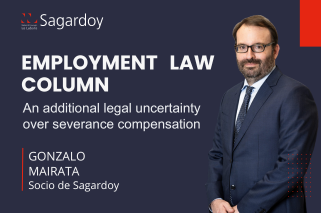We are living in times of legal uncertainty—or at least, of unpredictability—regarding compensation in the field of labour relations. Following the decision of the European Committee of Social Rights, the limits of severance compensation have been called into question, and, as is inevitable, voices both in favour and against its application have emerged. We will not dwell at this time on that specific issue, limiting ourselves to noting that a legal system is not entirely just unless it upholds the principle of legal certainty. This is the case regardless of whether the solutions adopted by the legislature to address real-life problems are accurate or not. Legal actors in the labour field—companies, workers, and trade unions—need to know the consequences of their actions. In short, they need certainty and predictability in order to make decisions and act securely, regardless of whether they agree with the legislative solution to a given problem.
In this context, we raise an additional uncertainty in relation to compensation—one that may have gone unnoticed or not been given due importance in the private sector, despite its evident implications for the public sector. This concerns compensation for the abuse of fixed-term employment contracts, specifically, the award to the worker of compensation intended to redress the harm caused by the employer’s abusive use of a fixed-term employment relationship.
Our starting point, to avoid unnecessary elaboration, will be the doctrine established by the judgment of the High Court of Justice of Madrid No. 944/2023, dated 27 October 2023 (appeal 304/2023), which recognises a specific compensation for the abuse suffered by a worker in the context of fixed-term contracting. In any case, this is a form of redress independent from any severance compensation the affected worker may receive due to the termination of the employment relationship, or from the conversion of that relationship into a permanent one—through, in that instance, the appropriate stabilisation selection process. This doctrine has been followed by similar rulings from various courts and could be reinforced by recent judgments of the Court of Justice of the European Union dated 22 February 2024 (C-59/22, C-110/22, and C-159/22) and 13 June 2024 (C‑331/22 and C‑332/22), which state, insofar as is relevant here, that the payment of compensation upon contract termination is independent of any assessment of whether there has been an abusive use of fixed-term contracts or relationships.
It is true that these judgments refer to workers in the public sector and are based on Directive 1999/70/EC and the interpretation by some of our courts of various rulings from the Court of Justice of the European Union. However, if we abstract from the specific facts and distil the legal doctrine underlying these decisions, we may conclude that the message is clear: a worker who has suffered abuse in a fixed-term employment relationship may claim specific compensation to remedy the harm suffered—at least in the public sector. Such compensation or redress is not limited by the fact that the worker has received or may receive severance pay upon termination of the employment relationship, or that the relationship has been or may be converted into a permanent one; rather, it arises solely and exclusively from the harm resulting from the abuse suffered. In short, and as the claimant in the case at hand expressly stated, it is “compensation for the years of distress.”
Furthermore, if we examine the matter more closely, we cannot help but glimpse in the background of these judicial decisions—even if not expressly mentioned—the general doctrine of abuse of rights, already enshrined in Article 6.2 of our Civil Code, which provides, in essence, that any act or omission that clearly exceeds the normal limits of the exercise of a right shall give rise to the corresponding compensation.
And here lies our doubt: is this doctrine applicable by analogy to the private sector? Could workers in the private sector claim compensation from their employer solely on the grounds of having suffered abuse in fixed-term contracting? Will such claims eventually extend to the private sector? The abuse in this area is clear in many cases of public sector employment, but it is undeniable that numerous instances of abuse in fixed-term contracting also occur, have occurred, and continue to occur in the private sector.
Perhaps it is too early to provide an answer. We do not know how the labour courts would respond to such claims. Perhaps the application of such measures to the private sector would be excessive, in which case it should also be considered excessive in the public sector. We leave the matter open for the reader’s reflection. Nonetheless, we highlight that this brings us back to our starting point—namely, to uncertainty, and ultimately, to the insecurity that is the true subject of this commentary. Let this serve, therefore, as a plea in favour of the principle of legal certainty and against the legal insecurity currently prevailing in the field of labour relations. Labour law practitioners—employers, workers, and unions alike—need, and we need, a legal system that is not only just but also predictable, for true justice can only be achieved through such certainty and stability.



